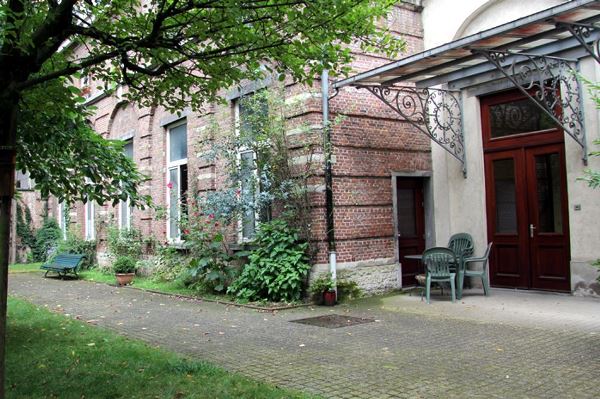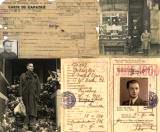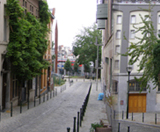New videos (only partially in English)
Table of contents and abstracts of issue no. 118 (Dutch/English)
Table of contents and abstracts (French/English)
Editorial: On the circulation of swastikas (Philippe Mesnard)
Agenda
Logbook
- The Jewish Museum and Tolerance Centre in Moscow (Ewa Bérard)
- “How beautiful this sad world is” (Isabelle Galichon)
- Ida, or we’ll all go to heaven (Gabriel Raichman)
- Het beeld als getuigenis, het beeld als document. Interview met Christophe Cognet [The image as testimony or as document. Interview with Christophe Cognet] (Luba Jurgenson and Paul Bernard-Nouraud)
- Lo Real volgens Israel Galván [Dancing The Real] (Isabelle Galichon)
- Een theatraal memorandum [A memorial on stage] (Isabelle Galichon)
- Le carnaval des ombres (Daniel Weyssow)
- The Passenger, an opera (Jean-Christophe Le Toquin for ResMusica)
Close-up: Het verhaal van 14-18. De oorlog door de lens van slachtoffers, burgers en historici [Remembering 14-18. The Great War through the eyes of victims, civilians and historians]
- Tussen feit en fictie. Interview met Sophie De Schaepdrijver [Between fact and fiction. Interview with Sophie De Schaepdrijver] (Philippe Mesnard and Anneleen Spiessens)
- Catastrophe vs. tragedy. Interview with Annette Becker (Luba Jurgenson and Philippe Mesnard)
- The Great War: from witnesses to historians, from memory to history? (Nicolas Beaupré)
Portfolio: Herinnering stand-by, de voormalige vernietigingskampen in Polen [Memory stand by: the former extermination camps in Poland]
Interview: Joshua Oppenheimer, “The aim of all genuine art is always engaged” (Anneleen Spiessens)
Dossier: In naam van de slachtoffers – Dictatuur en staatsterreur in Argentinië, Chili en Uruguay [In the name of the victims. Dictatorship and State terror in Argentina, Chile and Uruguay]
- Inleiding [Presentation]
- Wat als de slachtoffers spoorloos zijn? De zoektocht naar verdwenen gevangenen tijdens en na de dictatuur [When the victim is nowhere to be found. Chile’s “disappeared” and the families that have been searching for them during and after the dictatorship] (Antonia García Castro)
This article deals with the Chilean association of Families of Detained Disappeared. It examines issues related to the qualification of victims during and after the dictatorship (1973-1989). Particular emphasis is laid on the actions of the families and the way they consider themselves as the representatives of a third party which, for them, is first and foremost a political actor. - Slachtoffers, families en burgers. De strijd om het legitieme verhaal [Victims, their families and the citizens. The struggle for legitimacy] (Elizabeth Jelin)
In the Argentine experience, the visibility and legitimacy of the voices anchored, in first place, in family loss and latter in corporal experience of the repression and the close participation in political militancy during the 1970s, seems to delineate a political scenario that defines the notions of “victims” and “citizens” as antagonic, with prominence given to the first one. The present article enquires the centrality of the role of familism and the testimonial voice during the last military dictatorship in Argentina (1976-1983). - Het verhaal van de Noche de los Lápices. De verdwenen schoolkinderen als ‘onschuldige slachtoffers’ [The story of the ‘Noche de los lápices’. Disappeared school pupils as innocent victims] (Sandra Raggio)
During Argentina's transition to democracy, many stories about the military dictatorship repressive actions became known on a massive scale, told by the survivors or by the “desaparecidos” relatives. One of those stories was called “La Noche de los Lápices” (night of the pencils), which became an iconic event that had great social repercussions: a book written about the subject had more than ten editions and a movie that it is still widely seen. This article analyzes the reasons for such repercussion, centering on the figure of “the innocent victim”. - ‘Subversieve elementen’, ‘gefolterden’, ‘NN’. De slachtoffers van de staatsterreur in de Argentijnse overgangspers [“Subversive”, “tortured”, “NN”: victims of state terrorism in the Argentinian press] (Claudia Feld)
In 1984, during the first months of the democratic transition in Argentina, the media started to deal with, mainly, the disappeared and the clandestine repression. Within the context of the media “destape” (uncovering) which first occurred in the uncensored press, such media treatment, far from uncovering clear information about the state’s terrorism, produced a gruesome and sensationalist picture that some observers dubbed the “horror show”. This paper examines the way in which the figure of the “victim” of forced disappearance was elaborated in the Argentinian press between the months of January and May 1984. Instead of using the notion of “victims” or “innocent victims”, the media referred to the disappeared persons as “subversives”, “tortured” or “NN”. The analysis allows us to present some hypotheses in relation to “memory conflicts” at the beginning of the transition. - Herinneren en vergeten. Oblivion en de deconstructie van de slachtofferfiguur [Victims of remembrance and forgetfulness: deconstructing processes of victimization in Oblivion] (Susana Draper)
In this article, I approach how the figure of the victim emerges in feminine textual space as a form of resistance to the ways in which the category itself has been stereotyped around two nuclei: on the one hand, that of the militant heroes, who remember or are remembered from within the perspective of a (masculinized) brave epic; and, on the other hand, that of the defenseless victims who remember or are remembered from within a (feminized) subjectivist logic of pain and impotency. Analyzing a specific text, Oblivion, written by former Uruguayan political prisoner Edda Fabbri, I interrogate the moments in which such polarity (hero-victim) is deconstructed, and I state that resistance to this dichotomy structures the way in which Fabbri sees the possibility of thinking about the past differently. - Onschuldige slachtoffers of militante helden? De herinneringspolitiek en het moeilijke debat over de slachtoffers [Between the innocence and the heroism: tensions in the victim’s qualification in the politics of memory] (Luciana Messina)
This articles proposes to reflect on the tensions that go through the category of “victim” in the politics of memory related to the establishing of memorials of State terrorism in Argentina. How are the victims qualified and presented in the places and locations of memory in Buenos Aires City? Which identities are brought into play? We will take as material analysis an event that took place in the former clandestine detention center Olimpo. Specificaly, we will highlight divergent and conflictive meanings around the category of victim. - De plaats van het slachtoffer: landschap en rouwproces [Sites of victimhood: mourning and the landscape] (Jens Andermann)
This article proposes to explore the role of the landscape in postdictatorial architecture and cinema from the Southern Cone. Landscape opens within space a threshold where the absence of places for mourning can be both marked and counteracted. Some of the architectural and cinematographic constructions adopt the form of the monument so as to reinscribe the victims in their absence – as emplaced names – into the social geography. Others, on the contrary, open up spaces of itinerancy where mourning becomes a radical aesthetic and political practice of transforming the present. - Biblio-filmo-sitography
- It happened seventy years ago, in Hungary (Szabolc Szita)
- The Death of Ezequiel Demonty and the End of Human Rights in Argentina (David M. K. Sheinin)
- Bolsheviki: A Dead Serious Comedy (Paola Irene Galli Mastrodonato)
- Thierry Baudet, Oikofobie: de angst voor het eigene (Fabian Van Samang)
- Ivan Jablonka & Annette Wieviorka, Nouvelles perspectives sur la Shoah (Fabian Van Samang)
- Deborah Dwork & Robert Jan Van Pelt, Exodus: Joden op de vlucht uit het Derde Rijk (Jean-François Forges)
- Sönke Neitzel & Harald Welzer, Soldaten. Over vechten, doden en sterven (Robert Khan)
- Alain Kleinberger & Philippe Mesnard, La Shoah. Théâtre et cinema aux limites de la representation (Anne Roche)
- Valentina Pisanty, Abusi di memoria (Frediano Sessi)
- Antoine Vitkine, Mein Kampf, histoire d’un livre (Anne Roche)
- Alain Berenboom, Monsieur Optimiste (Désirée Schyns)
- Sharon MacDonald, Memorylands. Heritage and Identity in Europe Today (Dario Miccoli)
- Oscar Guardiola-Rivera, Story of a death foretold: The coup against Salvador Allende, September 11th, 1973 (Lindsey Churchill)
- Lindsey Churchill, Becoming the Tupamaros: Solidarity and Transnational Revolutionaries in Uruguay and the United States; Federico Finchelstein, The Ideological Origins of the Dirty War: Fascism, Populism, and Dictatorship in Twentieth Century Argentina; Francesca Lessa, Memory and Transitional Justice in Argentina and Uruguay: Against Impunity (David M. K. Sheinin)
- Arnout Hauben & Johanna Spaey, To War. A Journey Along the Front of World War I (Tom Vanassche)
- Christopher Clark, The Sleepwalkers. How Europe Went to War in 1914 (Hanna Teichler)
- Iain Chambers et al., The Postcolonial Museum: The Arts of Memory and the Pressures of History (Sayma Khan)
Dictionary of testimony and memory
- Cassandra (Véronique Léonard-Roques)
- The grey zone (Stef Craps)
- Memorialist (Damien Zanone)
- Postmemory (Marianne Hirsch)
- Redignification (Marie Ines Harté)
- Soldier-poet (Nicolas Beaupré)
- The Righteous (Sarah Gensburger)
- The writing of disaster (Éric Hoppenot)
- Memorial site: Downtown memorial (Philippe Mesnard)
The latest
Memory laboratory:RWANDA – De kerken-massagraven van de genocide, Kibeho [RWANDA – The churches-ossuaries of the genocide, Kibeho] (Rémi Korman)
Some of our projects
Contact
Auschwitz Foundation – Remembrance of Auschwitz
Rue aux Laines 17 box 50 – B-1000 Brussels +32 (0)2 512 79 98
+32 (0)2 512 79 98 info@auschwitz.be
info@auschwitz.be
BCE/KBO Auschwitz Foundation: 0876787354
BCE/KBO Remembrance of Auschwitz: 0420667323
Office open from Monday to Friday 9:30am to 4:30pm.
Visit only by appointment.
![]()
![]()
![]()
![]()
![]()
Become a member
To become a member of Remembrance of Auschwitz ASBL, please contact us and transfer the sum of €50.00 to our account IBAN: BE55 3100 7805 1744 – BIC: BBRUBEBB with the communication: ‘Membership fee 2025’. The membership includes two issues of 2025 of our scientific journal.
DONATIONS
Donations of €40.00 or more (in one or more instalments) qualify for tax exemption for Belgian taxpayers.
In communication, please specify that it is a ‘Donation’ and mention your National Number which is required since 2024 to benefit from the tax exemption.
Subscribe
Error : Please select some lists in your AcyMailing module configuration for the field "Automatically subscribe to" and make sure the selected lists are enabled










 The Auschwitz Foundation was founded in 1980 by Paul Halter, an Auschwitz survivor. Replacing the Amicale Belge des Ex-Prisonniers politiques d’Auschwitz-Birkenau Camps et Prisons de Silésie, the primary objective of the Auschwitz Foundation is to study the history and memory of the victims of the Holocaust and the Nazi terror in a sustainable and systematic way. The transmission of memory and the preservation of archives concerning these events complete this goal.
The Auschwitz Foundation was founded in 1980 by Paul Halter, an Auschwitz survivor. Replacing the Amicale Belge des Ex-Prisonniers politiques d’Auschwitz-Birkenau Camps et Prisons de Silésie, the primary objective of the Auschwitz Foundation is to study the history and memory of the victims of the Holocaust and the Nazi terror in a sustainable and systematic way. The transmission of memory and the preservation of archives concerning these events complete this goal.





